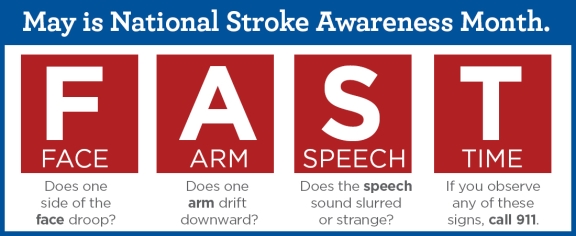Blog Material Written By: Corey Edmonds, MPH, Community Health Worker
May can not be allowed to come and go without the mention of Stroke Awareness Month. Each year approximately 800,000 people in the United States alone suffer from a stroke and approximately one out of every nineteen deaths in the U.S. is caused by a stroke.1 A stroke occurs when either the blood supply to the brain is blocked (Ischemic Stroke) or when a blood vessel located in the brain bursts (Hemorrhagic Stroke). Strokes are sometimes also referred to as a brain attack. Regardless of the nature of the stroke, the result is death of brain tissues which can lead to permanent brain damage, lasting physical and mental disabilities, and even death.
The easiest way to remember the signs and symptoms of a stroke is with the acronym F.A.S.T.:
F. = Does the side of the face droop?
A. = Does one arm drift downward?
S. = Does the speech sound slurred or strange?
T. = If you observe any of these signs, call 911.
Some other symptoms that may be experienced during the early onset of a stroke include:
- Sudden dizziness, trouble walking, or loss of balance and coordination
- Sudden trouble seeing in one or both eyes
- Sudden severe headache with no known or obvious cause
- Sudden numbness of the face, arm, or leg
- Sudden confusion or trouble understanding others
If at any point you suspect that you or someone around you may be having a stroke, it is important to call 911 immediately. The faster a stroke is recognized and treated, the better the potential outcomes are for the person involved.
As is the case with most other medical ailments, stroke can easily be prevented with a little bit of effort. Steps that can be taken to help reduce the risk of stroke include:
- Maintaining a diet low in sodium with plenty of fruits and vegetables
- Maintain a healthy weight
- Be physically active
- Do not smoke cigarettes and avoid exposure to second-hand smoke
- Limit the consumption of alcoholic beverages
- Prevent or manage any other health conditions that you may have
Having a stroke can be a life-altering and life-threatening ordeal. Being educated about stroke, stroke prevention, and what to do in case you ever find yourself such an emergent situation can be the difference between life and death for you or someone you love. Anyone can have a stroke. Everyone should be ready. #StrokeMonth
For more insight into a stroke, the following videos help to enhance your knowledge and readiness.
From the American Stroke Association:
From the Centers for Disease Control and Prevention and the Paul Coverdell National Acute Stroke Program:
Sources:

